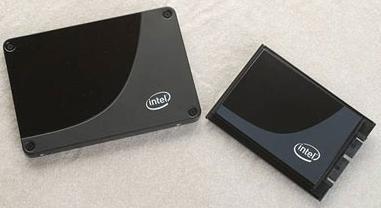Intel Cuts Prices of SSDs
Intel has dashed the prices in its line of solid-state drives. The company didn't detail the reason behind the drop, which saw its X25-M 80 GB notebook drive drop from $595 to $390 and its X25-E 32 GB enterprise SSD drop from $695 to $415. The 160 GB X25-M has also dropped from its $945 launch price to $765, a savings of nearly $200 for eager solid-state consumers.
We’ve talked about the oversupply of NAND flash in the market before. In an interview with PC Magazine, Fusion-io CTO, David Flynn speculated that the price cuts could be Intel’s attempt to leap out in front of the imbalanced market. Market research firm DRAMeXchange has called for the oversupply of NAND flash to balance out toward the latter half of 2009. This would push hard drives and solid-state drives closer to one another in their price points, even though the former will still dominate the cost-per-gigabyte ratios for some time.
The price cuts could also signal Intel’s desire to pave the way for a less expensive solid-state drive to come. The company is expected to launch its largest solid-state drive yet, a 320 GB variant, in the fourth quarter of this year. By the time that hits, 512 GB solid-state drives will already be on the market and terabyte SSD might very well be available as well.
Intel has secured the performance crown with its consumer-focused X25-M solid-state drives, but it’s in line to be crushed by competing capacity points. If the company is able to lower its price-per-gigabyte ratio for the drives, it could remain competitive against (assuredly) more expensive, higher-capacity models. After all, consumers’ chief criticism of solid state drives isn’t their capacity points or speeds. Few outside of the enterprise market are willing to pay four-figure sums for speedy, high-capacity solid-state storage. Although it has a ways to go before it can stand against the price points of competing solid-state drive manufacturers, Intel’s cuts represent an understanding that the war of the solid-state drive isn’t going to be over the fastest bits and bytes, rather, the fewest dollars and cents.
Get Tom's Hardware's best news and in-depth reviews, straight to your inbox.
-
I'd like to see a performance test of the Intel X-25M vs the new Seagate 500GB 7200.4 HD. In the first (fastest) 80 GB of the disk the Seagate runs at 90 to 100 MB/sec sequential read. Not as fast as a the Intel, but in the real world I wonder how much difference it makes. Is it worth $400 over $140?Reply
-
sdcaliceli I don't know about everyone else, but SSD is no option for me at that price point. You can purchase a new notebook at the same price as these drives and although they may offer some benefit, the cost ratio is not justified - especially at their storage ranges. Intel is slashing prices to see some kind of movement in inventory. I really don't expect these to fly off the shelves despite their popularity and hopefully that will force intel to cut prices much more.Reply -
apache_lives Ack noobs - go check what people are saying at newegg on the X25M!Reply
Its like a premium option on your computers not an essential so dont expect essential prices etc - both will still run windows and be limited in games by your video card/cpu/memory etc, just that "thrashing" on normal mechanical hdd's goes away because it can do multiple transfers 100x better then there mechanical variants etc. -
I doubt that we'll see a terrabyte drive this year! I think they will be introduced later!Reply
Though with the economic instability you never know!
Also, am I reading this right? The 80GB Notebook drive costs less than the 32GB Desktop SSD? -
I paid $400 for a 128-gig SSD a few months ago at a leading retailer (Fry's Electronics), and the prices continue to drop (as of this post the same hard drive is down to $250). You can see the current prices on their website.Reply
It's no wonder Intel is dropping their prices, they are overpriced to begin with. -
For our database apps that are painfully slow on a raptor, I am hopeful that SSDs will make a big difference in performance, am waiting for something like the fusion i-o...Reply
http://www.dvnation.com/Fusion-IO-IODrive-SSD-Solid-State-Disk-Drive-Review.html
Now .that. is performance! -
blackened144 ReplyFor our database apps that are painfully slow on a raptor, I am hopeful that SSDs will make a big difference in performance, am waiting for something like the fusion i-o...
http://www.dvnation.com/Fusion-IO- eview.html
Now .that. is performance!
We have been testing the fusion Io drive here at work and that thing flies. The main problem with them right now is the drive space. We have supercomputer systems manipulating huge datasets. Our older machines were running 10k 300GB SCSI drives and our newest servers come with extremely expensive hardware sas controllers, yet we are using 7200 RPM drives because they are the only ones that come in 1tb size. As it is now each cluster has over 800tb of space, imagine the cost of 800tb of Fusion Io cards. At home, I have been thinking about getting some cheap SSDs. Intel needs to cut prices a lot more for me to even consider them. For $120 I can get 2 30gb OCZ Core Series v2 drives. From what I have read putting them in raid0 greatly reduces the slow writes penalties that plague most SSD drives. -
blackened144 Damn Newegg. Those $60 30gb Core Series v2 drives are now $85 after rebates. For $170, it doesnt seem as tempting..Reply -
TrueMarine I am going to wait until this time next year for one of these solid state drives in raid 0. The price is still a little to high!Reply
